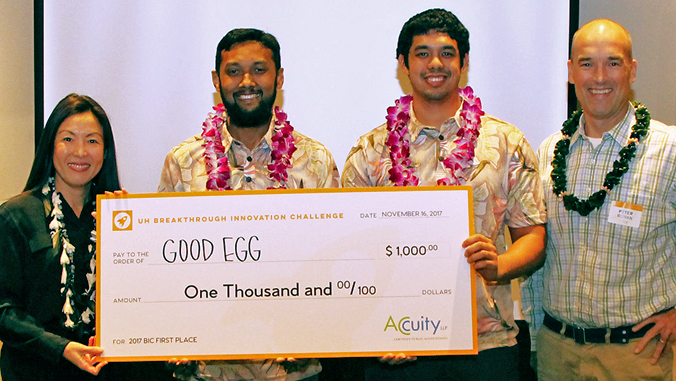
A duo of University of Hawaiʻi at Mānoa College of Engineering students took top honors in the UH Mānoa Pacific Asian Center for Entrepreneurship (PACE) Breakthrough Innovation Challenge for their idea that provides a solution to hunger in developing countries. Arif Rahman and Kainalu Matthews of team Good Egg received $1,000 for developing a noninvasive test for embryo health-check during in vitro fertilization of bovine cattle. Their technology of an automated washing and grading system of bovine embryo will produce more pregnant cattle, and therefore, more livestock for global protein supplies.
“This event showcases and celebrates the innovative ideas of our students at UH,” said Peter Rowan, executive director of PACE. “Many of the finalists study disciplines other than business, so for them, it’s their first taste of business and entrepreneurial concepts. Our hope is that they are inspired by the experience and decide to further develop their idea by competing in the more rigorous spring business plan competition.”
In addition to first prize, Good Egg captured the $500 Audience Choice award that was determined by audience votes. Team Osmopot took second place and received $500 for its water conservation and solar purification potted plant technology.
Other finalists included Biobattery which provides an affordable, biofriendly, non-explosive/non-toxic solution for energy storage and Hyetopura, a deconstructed water-filtering straw that allows users to disassemble and reassemble the device themselves.
About the Breakthrough Innovation Challenge
Now in its eighth year, the Breakthrough Innovation Challenge is UH’s first challenge of its kind that provides students and faculty with the opportunity to:
- Bring attention and recognition to their innovations
- Network with community leaders and others within the university who may be helpful in the further development of the innovation
- Win cash prizes
This year the competitors were challenged to showcase innovative solutions for the planet’s issues in food, energy and water. PACE asked students and faculty to submit fresh ideas that mimic nature to solve human problems. In the qualifying round, challengers submitted two-minute videos detailing their breakthrough idea and its market potential.
The video submissions were viewed and ranked by a preliminary round of judges. The finalists were announced and paired with a mentor to prepare them for the last phase, where they presented their ideas and the commercial potential to a final judging panel.
The panel was comprised of Steve Kiser, senior program manager at CUBIC Global Defense; Julia Okinaka, president of Accuity Consulting Services; Jill Sims, COO and head of innovation deployment with Elemental Excelerator; and Susan Yamada, director of UH venture for the UH System.
The challenge is sponsored by Accuity LLP and organized by PACE in partnership with the UH Mānoa College of Engineering, the College of Tropical Agriculture and Human Resources and the William S. Richardson School of Law.
For more information, visit the challenge website.

